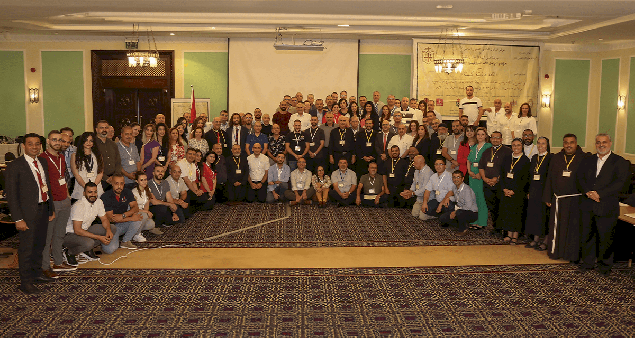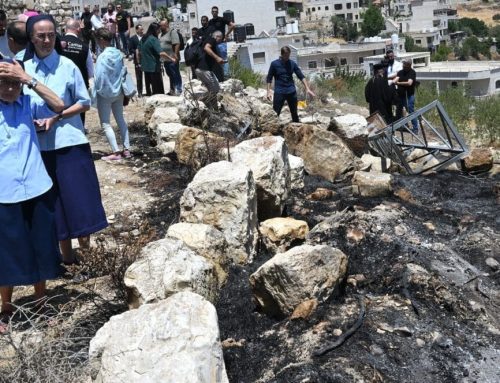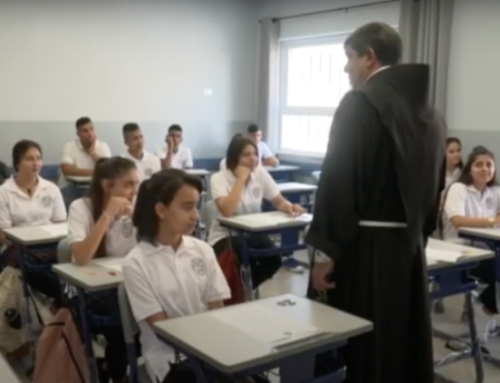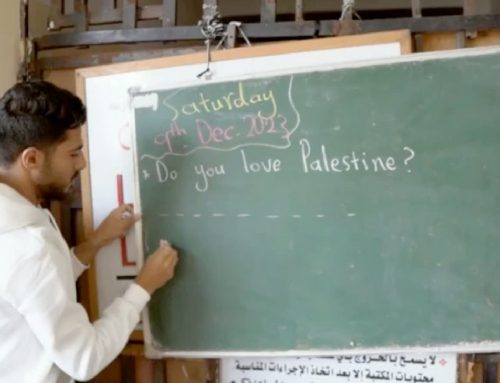JORDAN – From July 23rd to July 29th, 2023, the Ecclesiastic Courts of the Diocese of the Latin Patriarchate of Jerusalem held its 10th Annual Canonical Conference, at the Movenpick Dead Sea Resort, under the title “Canon Law Continuous Education”.
Since 2012, the Ecclesiastical Court of the Latin Patriarchate has been collaborating with the Pontifical Lateran University in Rome to offer the faithful – judges, lawyers, and priests – legal education and trainings by holding a yearly conference. Professors, doctors, and distinguished priests get assigned to offer lectures relating to the topic of marriage, its provisions, and the procedures of new canon laws issued by the Holy See.
In this year’s conference, 70 Christian lawyers, and 30 priests from both the Latin Patriarchate, and other local Churches attended the sessions.
His Beatitude Pierbattista Pizzaballa, Latin Patriarch of Jerusalem, opened the first day of the conference by presiding over a Mass, which was held in tribute to late Prof Manuel Arroba Conde, who was a main lecturer in all the conferences since 2015, and has contributed to the education of many lawyers. Concelebrating the Mass was Mgr Jamal Daibes, Patriarchal Vicar for Jordan, Mgr Giovanni Pietro Dal Toso, Apostolic Nuncio for Jordan, and Greek Melkite Bishop Most Rev. Joseph Jabara.
In his homily, Mgr Pizzaballa expressed his joy for witnessing the 10th annual conference, stating that it is a great opportunity to raise the affairs of the Ecclesiastical courts in the Middle East. “I was able to witness to the important and essential work of the court in the life of the Christian families, in my years of service at the Latin Patriarchate. Your work is not only legal but is also connected to the salvation work of the Church. Because you deal with the lives of the families more than any other pastoral work of the diocese, as well as dealing with the deep wounds of the families,” he stated. “Do not forget to apply the law wisely and consider both the individual and collective good in each case”.
The first session was held on Monday July 24th, 2023, under the title “General Introduction to CIC”, which was led by Prof. Antonio Iacarino. It was followed by a lecture concerning the “Valid Marriage (C.1061), ”given by Father and doctor Humam Khzouz. The third lecture was given by Fr. Dr. Aktham Hijazin about the canons of the code of Canon Law pertaining to cases regarding the nullity of marriage. The fourth session focused on the “Bonum Coniugum”. It was given to me by Fr. Dr. Majdi Siryani and Prof Antonio Iacarino.
The next day the following topics were tackled: “Simulation (c. 1101)”, “Legal Maturity for Marriage (c. 1095)”, “Marriage consensus”, “Psychological Consciousness & Capability for Marriage”. Given by Fr. Emil Salayta, HE Bishop Hani Bakhoom, Fr. Dr. Sahwki Baterian, Fr. Dr. Humam Khzouz, and Dr. Caesar Hakeem.
On the third day, Fr. Dr. Majdi Siryani opened the day by explaining the “de ImpugnatIone sententlae”. Then HE Bishop Hanna Elwan gave a session to the participants about “Sacra Rota and Personal status Jurisprudence”. On the same day, Fr. Bashir Bader and Fr. Ibrahim Nino introduced the Pastoral Offices, which will soon be opened in different regions of the diocese, and the offices’ mission in supporting marriages. The day ended with the participants solving a case study titled “Partial Simulation 1101/2”, which was led by Fr. Dr. Majdi Siryani and Fr. Dr. Aktham Hijazin.
The second part of the conference was focused on the clergy. For two days they attended sessions, which focused on “Bonum coniugum”, given by Fr. Dr. Majdi Siryani, and “Major reasons for Marriage Conflict” given by Fr. Emil Salayta. Also, Fr. Bashir Bader and Fr. Ibrahim Nino led an open discussion centered on the sessions given to engaged couples. Finally, the conference ended with a lecture given by Fr. Dr. Aktham Hijazin, about the “Parish archives and Recommendations”.
To conclude, during His Beatitude’s homily, and commenting on the Gospel reading of “The Parable of the Sower”, Mgr Pizzaballa said: “We cannot abolish evil and sin from the world, and us human. But we are here to serve the justice, which is the wheat (good) in the parable.”
By: Miral Atik | lpj.org











